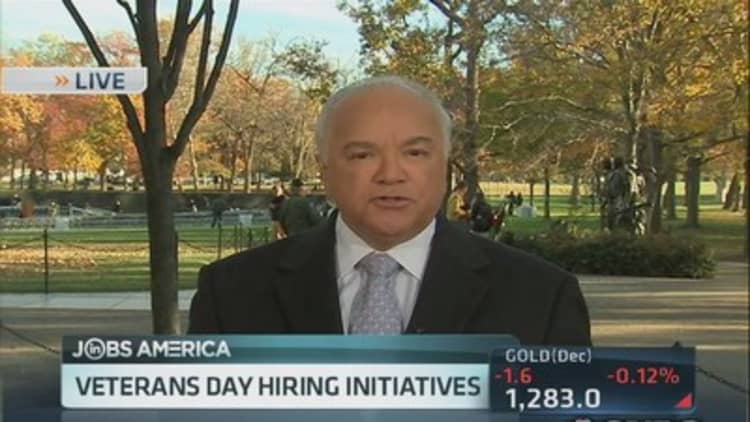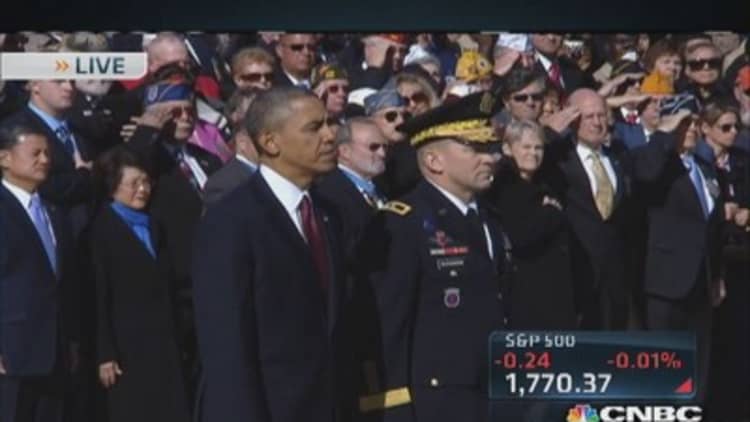As a sailor in the U.S. Navy for 29 years, Dave Collins traveled to the far corners of the earth in a submarine: Africa, the Arctic, the southernmost points of South America.
When he retired from the military in August, Collins briefly considered the same careers many fellow veterans pursued, including the Defense Department and law enforcement. But after three decades in and on the water, Collins was hungry for a new challenge. He found it on the work floors of America's manufacturing plants.
Collins landed a job at Advanced Technology Services. Based in Peoria, Ill., the midsize business maintains equipment for giants such as Caterpillar and Honeywell, as well as for smaller companies that make everything from golf-cart parts to chocolates.
"It's challenging to find people in manufacturing," said Holly Mosack, director of employee communications for Advanced Technology. "One of the jackpots we hit was to find people in the military."
Mosack herself retired from the Army after seven years, including service in Iraq. Her military job duties included financial, casualty reporting and postal operations.
Advanced Technology is among a growing number of U.S. companies making veteran hires a priority. This is happening as more men and women who served in Iraq and Afghanistan are returning home and seeking jobs. Last week, coffee chain Starbucks said it would commit to hiring at least 10,000 veterans and spouses of active military in five years. Still, many more former service members are still looking for work.
Unemployment among veterans remains a challenge, as many Americans continue to struggle to shore up finances after the Great Recession. The jobless rate for veterans is hovering around 7 percent, according to the Bureau of Labor Statistics, which mirrors the overall unemployment rate in the U.S.
(Read more: Starbucks wants to recruit 10,000 vets, spouses to its ranks)
Upcoming veteran hiring fairs
One unique effort that's fighting back against unemployment is a series of job fairs and employment workshops hosted by the U.S. Chamber of Commerce Foundation. Focused on veterans and military spouses, the workshops offer training on rèsumè writing, interview skills and one-on-one mentoring.
Des Moines, Iowa, is scheduled to host a hiring fair on Monday, which is Veterans Day. Many other hiring fairs are scheduled for U.S. cities for the rest of this year and into 2014.
The Hiring 500,000 Heroes campaign is asking businesses to commit to hiring that number of veterans and military spouses by the end of 2014. The effort includes commitments from large companies, including Comcast and NBCUniversal, which together have hired 2,000 veterans since January 2012, achieving their veteran hiring commitment two years ahead of schedule. (CNBC's parent company is NBCUniversal, a unit of Comcast.)
Such efforts have been helped by tax breaks signed into law in November 2011. The Returning Heroes Tax Credit provides businesses hiring unemployed veterans a maximum credit of $5,600 per veteran. The Wounded Warriors Tax Credit offers businesses hiring those with service-connected disabilities a credit of up to $9,600 per veteran.
(Read more: Veterans face new battle in private-sector job market)

'Different attitude'
Former Navy member Collins, meanwhile, learned about Advanced Technology independently through a friend. And therein lies a key lesson in transitioning into civilian life: network. Sign up for social media sites and cast a wide net on possible job leads.
Another lesson is to believe in your marketable, varied skills. Veterans can parachute into a new project or work space, get the lay of the land and learn quickly. Whether it's by sea as a Navy officer or by land as an Army soldier, military personnel are used to changing jobs and locations almost regularly.
"They also have leadership and discipline," said Mosack of Advanced Technology. "They just have a different attitude."

"This demographic represents one of the most underutilized talent pools in our country," former Defense Secretary Robert Gates told Reuters. Now a Starbucks director, Gates said that as the company expands globally and sources its coffee and tea from around the world, veterans offer international experience and foreign language skills.
Collins, now 47, has since become a master of a new suite of machinery. He works on everything from 1940s mill presses to modern robotics and advanced laser systems that slice through sheet metal. While daily tasks are different from those on a submarine, the skills and demands are similar: precision, making key decisions autonomously and tacking on a dime if necessary.
"You have to be cross-trained—electrical skills, robotics, mechanics. You have to be able to think on your feet," said Collins, who started at the company in September. "It really reminds me of the submarine mentality."
About 25 percent of Advanced Technology's 3,000 employees across the U.S., Mexico and the United Kingdom are former veterans. About 40 percent of its managers have also served in the military.
And to be clear, Mosack said, the company's high concentration of veterans is possible because the commitment to hire them comes from the top down.
—By CNBC's Heesun Wee. Follow her on Twitter @heesunwee
—An earlier version of this story incorrectly stated when Collins retired and started at ATS


